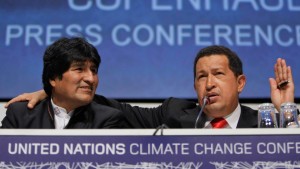 (miamiherald.com) While the mass exodus of more than 2.3 million Venezuelans and the murder of more than 300 anti-government protesters in Nicaragua are making big headlines, it may be time to pay attention to another country in the region that is also moving rapidly toward totalitarian rule: Bolivia.
(miamiherald.com) While the mass exodus of more than 2.3 million Venezuelans and the murder of more than 300 anti-government protesters in Nicaragua are making big headlines, it may be time to pay attention to another country in the region that is also moving rapidly toward totalitarian rule: Bolivia.
Bolivian President Evo Morales announced last week that he will submit to his country’s Congress – where he enjoys a comfortable majority – a “law against lies,” which would penalize news about his government that he doesn’t like.
In several statements in recent weeks, Morales said he will propose a law to “punish liars” in the media and to “moralize” independent news organizations. The Inter-American Press Association has denounced that the proposed law would impose an all-out censorship on the media.
It’s ironic that Morales does even dare to publicly bring up the issue of lying. He has repeatedly promised to retire after finishing his constitutionally-allowed term, only to circumvent the rule of law to re-elect himself several times.
Morales took office in January 2006, is now seeking a fourth five-year term next year, which would allow him to stay in power until January 2025.
After changing the constitution in 2009 to be allowed to run again, Morales convened a referendum in 2016 to change the constitution once again and be allowed to seek a new term in office. He publicly promised to respect and abide by the referendum’s outcome.
But Morales lost the 2016 referendum and broke his promise. His argument for violating the Constitution and the referendum’s outcome sounds like a joke: he has invoked article 23 of the Organization of American States’ human rights convention, which calls for the right of all people to seek public office.
Morales claims that his own human rights would be violated if he’s not allowed to run again. It’s a ridiculous argument that has been also used by the rulers of Nicaragua and Honduras.
Jorge “Tuto” Quiroga, a former Bolivian president who is now in the opposition, told me that “if Morales passes his ‘law against lies,’ he would have to be the first to go to prison because he is Bolivia’s biggest liar.”
Quiroga added that Morales “lied three times about a key issue such as his term-limits as president, not to mention all of his other lies.”
Among other things, Morales lied several times when facing a scandal involving a woman who reportedly obtained hundreds of millions of dollars in governments contracts, and with whom he allegedly had a child. The Morales government first denied that Morales was the child’s father, then said it was true, and finally claimed that the child had died. We still don’t know which story is true.
It’s no coincidence that Morales is now going after what’s left of Bolivia’s independent media. “Like the rulers of Venezuela and Nicaragua, his biggest allies, he no longer has the support nor the money he once had,” Quiroga told me.
The United States and Latin American countries should denounce Morales’ plan to crack down on independent media. They should invoke several inter-American conventions that commit signatory countries – including Bolivia – to respecting democratic rules and freedom of expression.
Unfortunately, under President Trump, the United States has no moral authority to lead on this issue. Trump himself has called the U.S. media “the enemy of the people,” and almost daily characterizes criticism against his government as “fake news.” In doing so, Trump has indirectly emboldened dictators of all ideological stripes to attack the free press.
Also, as Bolivia’s 2019 election draws nearer, Latin American governments should ask the Inter American Human Rights Court to issue a clear ruling on whether presidents can use their human rights clauses as an excuse to stay in power indefinitely.
“This farce of presidents using their personal human rights as a justification for indefinite re-elections must come to an end,” says Carlos Sanchez Berzain, an exiled Bolivian politician and former government minister. “It’s a legal trick that’s being used for a criminal scheme.”
It’s time for the region’s diplomatic community to speak out about the slow-motion coup d’etat that’s taking place in Bolivia before it escalates into a Venezuela or Nicaraguan-style crisis.
 Carlos Sanchez Berzain Abogado | Estadista | Político | Politólogo
Carlos Sanchez Berzain Abogado | Estadista | Político | Politólogo